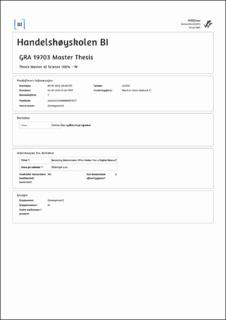| dc.description.abstract | In this fast-paced era, digital nomadism articles dominate social networking
platforms, capturing the attention of individuals seeking an alternative to their
mundane 9-to-5 lifestyles. While academic studies have explored this global
phenomenon, most rely on qualitative interviews to provide a general
understanding.
In contrast, our study collected 207 valid survey responses online and employed
the PLS-SEM approach. We extended the original TPB by incorporating two new
constructs: life satisfaction and policy expectation. Additionally, we examined the
mediating role of individual attitude and policy expectation, as well as the
moderating role of perceived behavioral control in the policy expectationintention
relationship.
Results indicate that all five constructs significantly impact individuals’ intention
to become digital nomads domestically and internationally. Perceived behavior
control has the most significant influence on domestic intention, while policy
expectation has the most potent effect on international intention. While individual
attitude mediates all proposed paths, policy expectation does not mediate multiple
paths leading to domestic intention. Furthermore, perceived behavior control only
mediates the relationship between policy expectation and domestic intention, not
international intention.
Our study uncovered the drivers influencing the decision-making process of
individuals becoming digital nomads. Furthermore, we reviewed the effectiveness
of current policies, products, and services in facilitating and supporting this global
phenomenon, contributing to developing a sustainable future for the digital nomad
lifestyle. | en_US |
